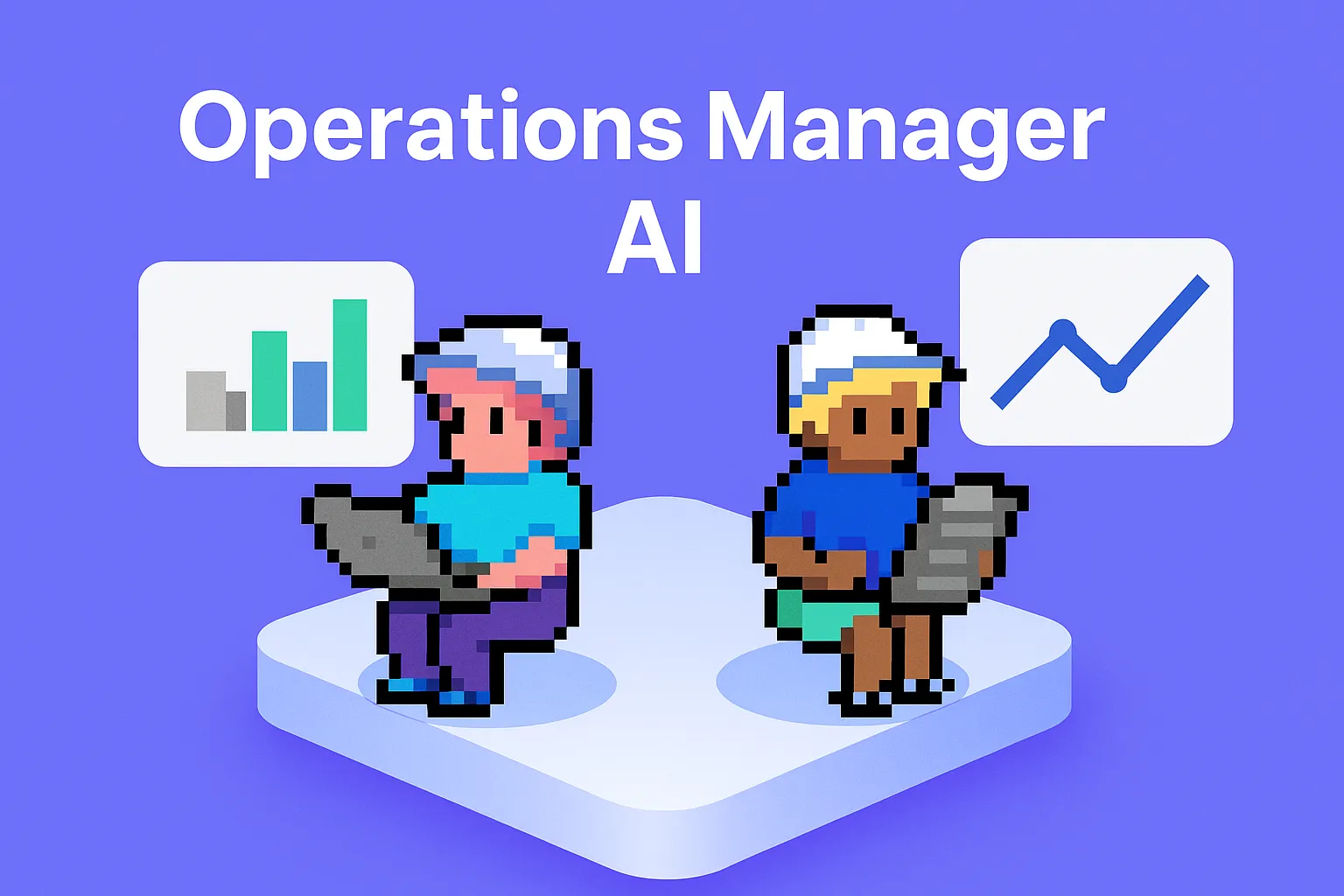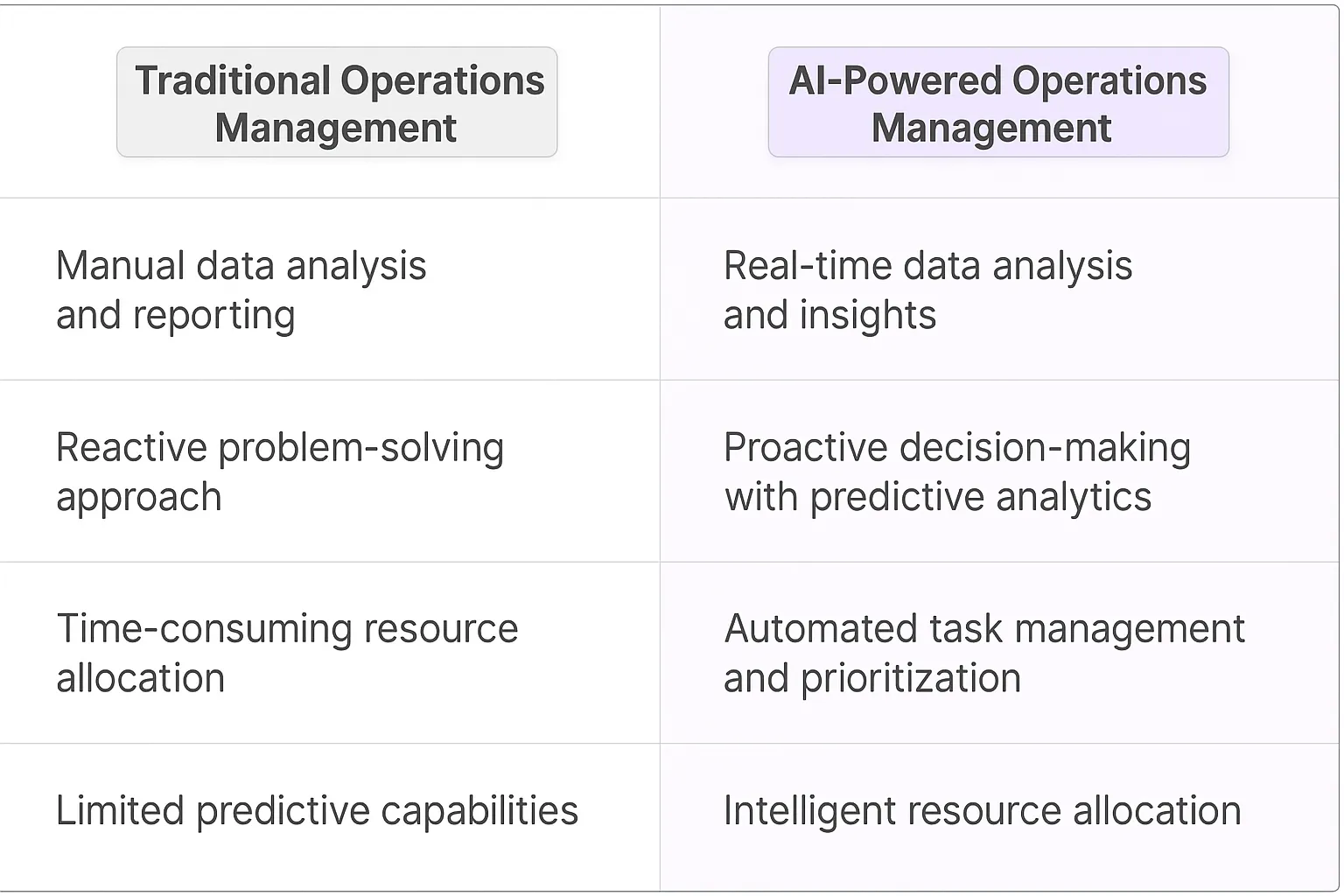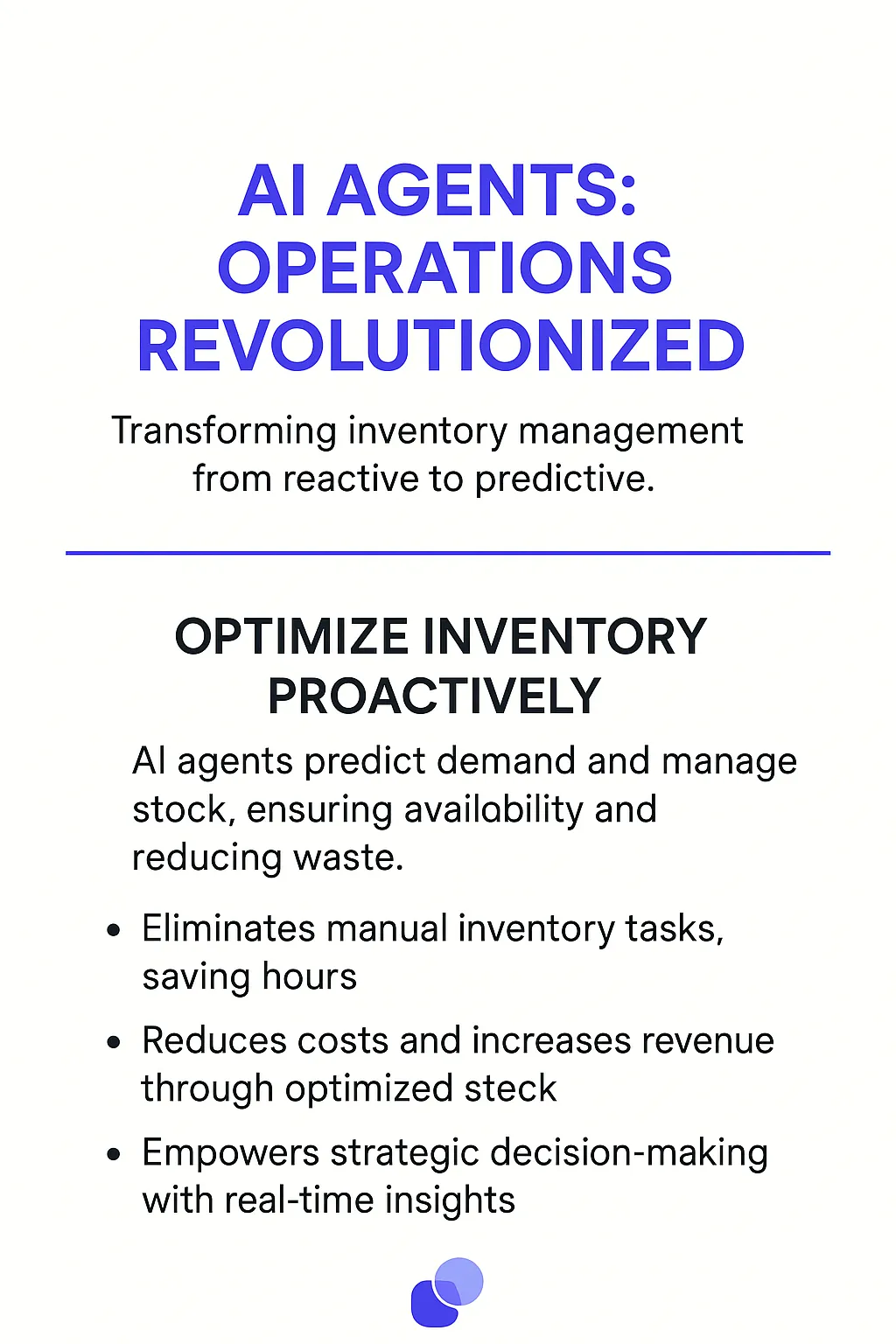Operations Manager is a critical role responsible for overseeing and optimizing an organization's day-to-day activities. This position involves managing resources, coordinating teams, and ensuring smooth operational flow across various business functions. In today's data-driven business landscape, Operations Managers are increasingly turning to AI agents to enhance their decision-making capabilities and streamline complex processes.
The key features of an Operations Manager role enhanced by AI agents include:
These AI-powered features transform the Operations Manager role from a reactive position to a strategic, forward-thinking one, enabling more efficient and effective management of complex operational ecosystems.

Before AI agents entered the scene, operations managers were stuck in a world of spreadsheets, manual data entry, and endless email chains. They'd spend hours sifting through reports, coordinating teams, and putting out fires. It was like trying to conduct an orchestra while simultaneously playing every instrument. The tools at their disposal were often siloed, rigid, and about as user-friendly as a brick wall.
Traditional software solutions offered some relief, but they were often clunky and required significant setup and maintenance. These systems were more like digital filing cabinets than actual helpers. They stored information but didn't do much to make sense of it or suggest actions. Operations managers were left to connect the dots themselves, often missing critical insights buried in the data.
Enter AI agents - the digital teammates that are transforming the operations landscape. These aren't just fancy chatbots; they're sophisticated systems that can understand context, learn from interactions, and provide actionable insights. Here's why they're game-changers:
1. Predictive Analytics on Steroids: AI agents don't just crunch numbers; they see patterns humans might miss. They can forecast inventory needs, predict maintenance issues, and even anticipate market trends. It's like having a crystal ball, but one backed by hard data and machine learning algorithms.
2. Adaptive Problem Solving: Unlike rigid software, AI agents can adapt to new situations. They learn from each interaction, continuously improving their responses. This means they get better at handling complex operational challenges over time, much like a seasoned manager would.
3. Natural Language Processing for Real Human Interaction: Gone are the days of navigating complex menu systems. Operations managers can now interact with AI agents using natural language. It's like having a brilliant assistant who understands exactly what you mean, even if you're not using technical jargon.
4. 24/7 Availability and Scalability: AI agents don't sleep, take vacations, or have off days. They're always on, always learning, and can handle multiple queries simultaneously. This scalability is crucial for growing operations where the workload can fluctuate dramatically.
5. Personalized Insights and Recommendations: By analyzing vast amounts of data, AI agents can provide tailored recommendations for each unique operational challenge. It's like having a consultant who knows your business inside out, but at a fraction of the cost.
6. Seamless Integration Across Systems: AI agents can act as the glue between different software systems, pulling data from various sources to provide a holistic view of operations. This integration eliminates data silos and provides a single source of truth for decision-making.
7. Continuous Learning and Improvement: Perhaps the most exciting aspect is that AI agents get smarter over time. They learn from every interaction, every decision, and every outcome. This means the value they provide to operations managers compounds over time, creating a virtuous cycle of improvement.
The introduction of AI agents into operations management isn't just an incremental improvement - it's a paradigm shift. It's taking the role of operations manager from a reactive firefighter to a proactive strategist. And in the high-stakes world of operations, where efficiency and agility can make or break a business, that's not just nice to have - it's mission-critical.
AI agents excel at predictive maintenance, continuously analyzing equipment performance data to anticipate potential failures and schedule maintenance proactively. This shift from reactive to predictive maintenance can dramatically reduce downtime and extend the lifespan of critical assets. Additionally, their advanced data analysis capabilities enable operations managers to make more informed decisions based on comprehensive insights from multiple data sources.

AI agents are reshaping how operations managers tackle complex challenges. These digital teammates excel at handling intricate processes that traditionally consumed significant time and resources. For instance, an AI agent can oversee supply chain optimization, continuously analyzing data from multiple sources to identify bottlenecks and suggest improvements. This level of real-time analysis was previously unattainable without a team of dedicated analysts.
Another compelling use case is in predictive maintenance. AI agents can monitor equipment performance data, anticipate potential failures, and schedule maintenance proactively. This shift from reactive to predictive maintenance can dramatically reduce downtime and extend the lifespan of critical assets.
On a more granular level, AI agents excel at handling repetitive yet crucial tasks that operations managers often grapple with. Take inventory management, for example. An AI agent can automate stock level monitoring, generate purchase orders, and even negotiate with suppliers based on predefined parameters. This frees up the operations manager to focus on strategic decision-making rather than getting bogged down in day-to-day inventory concerns.
Quality control is another area where AI agents shine. They can analyze production data in real-time, flagging anomalies and potential quality issues before they escalate. This proactive approach to quality management can significantly reduce waste and improve overall product consistency.
Let's talk about the game-changing potential of AI agents in operations management. These digital teammates aren't just tools; they're catalysts for a fundamental shift in how we approach operational challenges. They're like having a tireless, data-crunching genius on your team, constantly looking for ways to optimize and improve.
Consider demand forecasting. Traditional methods often fall short in capturing the nuances of market dynamics. An AI agent, however, can ingest vast amounts of data - from social media trends to weather patterns - and generate highly accurate demand forecasts. This level of precision can transform inventory management and production planning, potentially saving millions in carrying costs and lost sales.
But here's where it gets really interesting: AI agents can learn and adapt. They're not static tools but evolving partners. As they interact with your operations, they become more attuned to the unique aspects of your business. Over time, an AI agent could develop insights that even seasoned operations managers might miss.
The potential for AI agents in operations management is vast and largely untapped. We're just scratching the surface of what's possible. As these technologies continue to evolve, they'll likely become as indispensable to operations managers as spreadsheets and ERP systems are today. The operations managers who embrace and master these AI tools early will have a significant competitive advantage in the years to come.

The adaptability of AI agents in operations management is reshaping how businesses across sectors handle their day-to-day processes. These digital teammates aren't just tools; they're becoming integral parts of operational ecosystems. Let's dive into some concrete, industry-specific scenarios that illustrate how AI is transforming workflows and redefining operational efficiency.
From manufacturing plants to healthcare facilities, AI agents are proving their worth by tackling complex operational challenges. They're not replacing human managers but rather augmenting their capabilities, allowing for more strategic decision-making and freeing up valuable time for high-level tasks. The following use cases demonstrate the tangible impact these AI agents are having on various industries, showcasing their ability to optimize processes, reduce bottlenecks, and drive operational excellence.
The retail industry is ripe for disruption, and Operations Manager AI agents are leading the charge. These digital teammates are transforming how stores handle inventory, a critical yet often overlooked aspect of retail operations.
Take a mid-sized clothing retailer with 50 stores across the country. Traditionally, each store manager would spend hours each week poring over spreadsheets, trying to predict which items will sell and which will gather dust. It's a high-stakes guessing game that often leads to overstocked clearance racks or frustrated customers facing "out of stock" signs.
Enter the Operations Manager AI agent. This digital teammate doesn't just crunch numbers – it devours data from multiple sources. It analyzes past sales trends, factors in seasonal variations, and even considers local events that might impact demand. But here's where it gets interesting: the AI also scrapes social media trends, monitors fashion influencers, and keeps tabs on competitor pricing.
The result? A hyper-localized inventory strategy that feels almost prescient. The New York City store stocks up on sleek black cocktail dresses for Friday night parties, while the Miami location gets an influx of colorful beachwear just as a heatwave hits. The AI doesn't just react – it anticipates.
But the real magic happens when something unexpected occurs. A surprise cold snap in Texas? The Operations Manager AI agent immediately adjusts inventory across affected stores, rerouting winter coats and boots that were destined for northern locations. A viral TikTok trend suddenly makes purple sneakers the must-have item? The AI spots the trend early and triggers rush orders to capitalize on the demand spike.
This isn't just about efficiency – it's about creating a retail experience that feels personalized and responsive. Customers find what they want, when they want it, leading to higher satisfaction and loyalty. And for the retailer, it means less capital tied up in unsold inventory and fewer margin-killing clearance sales.
The human touch isn't eliminated – it's elevated. Store managers, freed from the drudgery of inventory calculations, can focus on training staff, improving store layouts, and engaging with customers. They become curators of experiences rather than stock counters.
This is just the beginning. As these AI agents learn and evolve, they'll start to influence everything from store layouts to staffing levels. The retail landscape is being rewritten, one data point at a time. And those who embrace these digital teammates will find themselves not just surviving, but thriving in this new era of intelligent retail operations.
Advanced demand forecasting capabilities enable these AI agents to predict customer needs with unprecedented accuracy, transforming how retailers approach inventory planning and customer satisfaction.
The construction industry is notoriously complex, with countless moving parts and variables that can make or break a project. Enter Operations Manager AI agents, the digital teammates that are quietly revolutionizing how we build our world.
Let's zoom in on a large-scale commercial construction project – say, a 50-story skyscraper in downtown Chicago. Traditionally, project managers juggle an overwhelming array of tasks: coordinating subcontractors, managing supply chains, ensuring safety compliance, and keeping the project on time and budget. It's a high-wire act where a single misstep can cascade into costly delays and budget overruns.
The Operations Manager AI agent steps into this chaos like a seasoned maestro. It doesn't just track tasks; it orchestrates the entire symphony of construction. This digital teammate ingests and analyzes vast amounts of data from IoT sensors on equipment, real-time weather forecasts, traffic patterns, and even social media chatter about local events that might impact work schedules.
But here's where it gets interesting: the AI doesn't just react to problems – it anticipates and prevents them. It spots potential supply chain disruptions weeks in advance and suggests alternative sourcing. It predicts equipment failures before they happen, scheduling preventive maintenance during natural lulls in the project timeline.
The AI's ability to optimize resource allocation is where the real magic happens. It dynamically adjusts work schedules based on a multitude of factors. A heatwave is coming? The AI reschedules outdoor work to cooler hours and shifts focus to indoor tasks. A key material is delayed? The AI instantly recalibrates the entire project timeline, reassigning workers to other critical path tasks to minimize downtime.
This isn't just about efficiency – it's about creating a construction process that's adaptive and resilient. The AI's constant optimization means fewer delays, reduced waste, and significantly lower costs. But more importantly, it creates a safer work environment. By predicting and preventing potential hazards, the AI becomes an invisible guardian for every worker on site.
The human element isn't diminished – it's amplified. Project managers, freed from the minutiae of daily scheduling and troubleshooting, can focus on high-level strategy and stakeholder management. They become visionaries rather than firefighters, able to spot opportunities for innovation that were previously obscured by day-to-day chaos.
As these AI agents learn and evolve, they'll start to influence everything from initial project bids to long-term urban planning. They'll analyze data from hundreds of projects to identify best practices and potential pitfalls, creating a feedback loop that continuously improves the entire industry.
The construction landscape is being rewritten, one algorithm at a time. Those who embrace these digital teammates won't just be building structures – they'll be constructing the future of the industry itself. And in a field where time is quite literally money, the competitive advantage of AI-powered operations management will be nothing short of transformative.
Implementing an Operations Manager AI Agent isn't just about plugging in some fancy algorithm and watching the magic happen. It's a complex dance of data, systems, and human processes that requires careful choreography.
First off, data integration is a beast. Your AI agent needs to tap into multiple systems - ERP, CRM, project management tools, you name it. Each of these systems speaks its own language, and getting them to play nice with your AI is like trying to host a UN meeting without translators.
Then there's the issue of data quality. Garbage in, garbage out, as they say. If your existing systems are full of inconsistent, outdated, or just plain wrong information, your AI is going to be about as useful as a chocolate teapot. You'll need to invest in serious data cleaning and standardization efforts.
Let's not forget about scalability. Sure, your AI might work like a charm when it's managing operations for a team of 50. But what happens when you scale to 500? Or 5000? You need to architect your solution with growth in mind from day one.
On the operational side, change management is your biggest hurdle. You're not just introducing a new tool; you're fundamentally altering how people work. Expect resistance. Some folks will see the AI as a threat to their jobs. Others will be skeptical of its capabilities. You need a solid change management strategy to get buy-in across the organization.
Training is another critical piece of the puzzle. Your team needs to learn how to work alongside this digital teammate. It's not just about using a new interface; it's about understanding how to interpret the AI's recommendations, when to trust its judgement, and when human intervention is necessary.
There's also the question of accountability. When the AI makes a decision that impacts operations, who's responsible? You need clear guidelines and processes for oversight and escalation.
Lastly, don't underestimate the importance of continuous improvement. Your AI isn't a set-it-and-forget-it solution. It needs ongoing tuning, training, and refinement based on real-world performance and feedback. This requires dedicated resources and a commitment to long-term optimization.
Implementing an Operations Manager AI Agent is a journey, not a destination. It's complex, challenging, and at times frustrating. But for those who navigate these waters successfully, the potential for transformative impact on operational efficiency and effectiveness is enormous.
The integration of AI agents into operations management marks a pivotal shift in how businesses approach operational challenges. These digital teammates are catalysts for a new era of data-driven, adaptive, and proactive management. While the implementation of AI agents comes with its share of technical and operational hurdles, the potential benefits far outweigh the challenges.
As we've seen across various industries - from retail to construction - AI agents are redefining what's possible in operations management. They're enabling hyper-localized inventory strategies, predictive maintenance, and dynamic project management that were once the stuff of science fiction. The key to success lies in embracing these technologies as powerful tools that elevate the role of operations managers to strategic visionaries.
The future of operations management is here, and it's powered by AI. Those who adapt and harness the power of these digital teammates will find themselves at the forefront of operational excellence, driving efficiency, innovation, and competitive advantage in ways we're only beginning to imagine. The journey may be complex, but the destination - a new paradigm of intelligent, adaptive, and hyper-efficient operations - is well worth the effort.